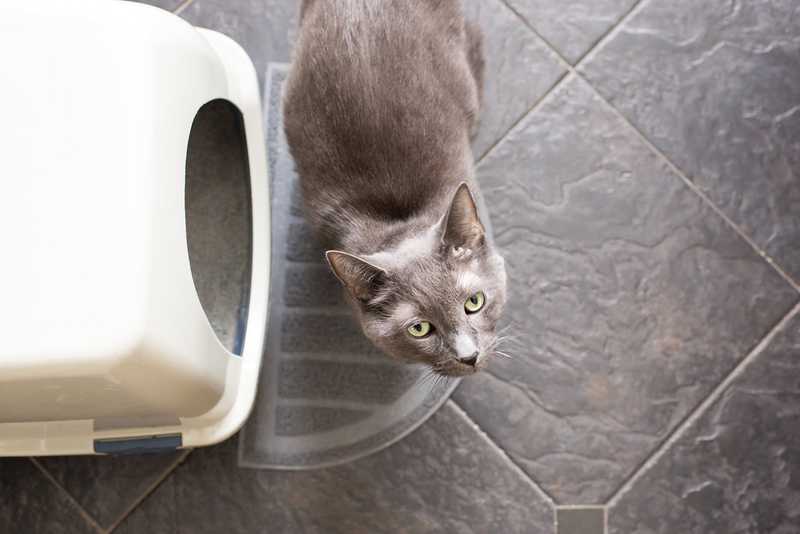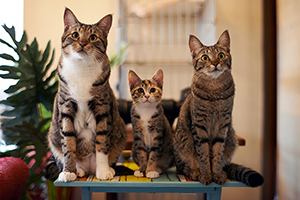New Cat? Learn to Control Cat Litter Box Odor

Some people wonder how to reduce cat litter box odor in any size space with a cat. Once you learn how to control litter odor, your home should have no stinky smell, even if it’s the smallest studio!
Need help learning how to stop cat litter odor? You’ve come to the right place. Here are some practical and effective tips for how to control odor for a new cat, ensuring a pleasant environment for both felines and their people.
Cat Litter Box Odor
Cat or kitty litter odor is a problem that can impact both cats and humans. Even if your cat is as tiny as can be, you must take proper care of the litter box.
One of the biggest challenges of having a cat is dealing with the smell of the litter box. Even if you don’t mind, it can be awkward when friends come over and notice the scent. Conversely, it feels great when your guests can see your cat but don’t smell anything unpleasant!
While litter box training is essential for your cat, it’s just as important to know about controlling cat odor through proper litter box hygiene to avoid those unpleasant odors.
Litter Box Hygiene
Litter box hygiene is essential for your cat’s well-being. Cat owners should keep on top of the following:
- Scooping the litter box daily
- Periodic litter replacement
- Washing the litter box
- Replacing your litter box to avoid scratches and crevices
If you’re dealing with unpleasant odors, know that there are some simple solutions. Here are some easy steps on how to prevent cat litter odor and create a happier space for you and your cat.
- Clean the litter box daily or even more often. Although you might not notice the smell of old urine and poop as much as the fresh ones, letting them sit for too long can make your whole house smell bad. You can help keep things smelling nice by scooping out the litter regularly!
- Are you wondering how often to change litter? Change the litter twice a week. Even if you clean it every time your cat goes, you might still miss some spots, and even a little bit of litter can start to smell after a while. Litter box cleaning is necessary to keep the box as sanitary as possible for your cat. Remove all the old litter, wash the litter box with soap and warm water (avoid cleaners that contain ammonia, which can increase the smell), dry the box and add new litter.
- Replacing your cat’s litter box once a year is a good idea. Over time, the box can get minor marks and scratches from your cat’s claws and from scooping it out. These little grooves can trap smells and make it harder to clean. To keep things fresh, consider giving your old litter box to a shelter or rescue group and getting your cat a new one each year.
- Consider getting a litter box that’ll help you monitor your cat’s litter box habits with the Petivity Smart Litter Box Monitor. This device transforms data about your cat’s litter box behavior and weight into valuable insights about their well-being. It allows you to track your cat’s daily and long-term weight changes, monitor their daily litter box habits, and receive monthly reports to take to your vet. You can also get alerted to key changes necessary for your cat’s health, ensuring their well-being and supporting a clean, odor-free litter environment. Petivity Smart Litter Box Monitors do not diagnose, treat, cure or prevent disease; they help improve your pet’s health and well-being. Always talk to your veterinarian about any health-related questions.
- Note that if you’re cleaning an area where your new cat urinated outside their box, do not use ammonia because urine contains ammonia. It could attract your cat to that same spot they urinated on. Use an enzymatic cleaner to neutralize the odor.
Other Litter Box Odor Control Tips

Here are a few other ways on how to eliminate cat litter odor.
- Consider using a deodorizer to eliminate odor from your cat’s litter box. A bit of baking soda or a gentle cat litter odor eliminator helps keep your home smelling fresh and free of odor. However, many cats prefer litter boxes that aren’t too strongly scented, so it’s crucial to choose a deodorizer that you and your cat will be comfortable with or opt for an unscented one. Every time you clean the litter box, mix a little deodorizer into the litter to keep things smelling nice.
- Litter choice has an impact on odor. Wondering what is the best cat litter for odor? You can use unscented odor control litter fresh-scented odor protection. Again, cats may be sensitive to particular scents, so try different litter varieties first to find the scent you and your cat like best. If your new cat is a kitten, though, you’ll want to stick to non-clumping varieties or scented litter for fresh-scented odor protection.
- If you have a covered box, ventilate and air out the box by removing the lid briefly daily. When choosing a place for your cat’s litter box, finding a spot with good airflow is crucial. Putting the litter box in a small, dark corner where smells can build can make it uncomfortable for your cat, and they might decide to use another area of your home instead—like your bed! To keep things pleasant for you and your cat, choose a bright and spacious location to enter, move around, and exit easily to help keep odors down and make your cat feel more at ease using it.
- You may want to consider an automatic litter box or a self-cleaning litter box system to simplify your litter box hygiene routine.
Read more Petfinder litter box cleaning tips to help ensure your home smells litter-free. For help finding the best litter and litter box products for you, check out the Tidy Cats and the Petivity Smart Litter Box product pages.
For even more expert tips on training your cat, explore our other cat and kitten training articles.